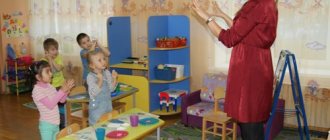Project “Finger games” project (junior group) on the topic
MUNICIPAL PRESCHOOL EDUCATIONAL INSTITUTION
CHILD DEVELOPMENT CENTER - KINDERGARTEN No. 29
Project "Finger Games".
Development of fine motor skills of the hands of children of primary preschool age
Completed by: teacher
MDOU TsRR-D/S No. 29
Baranova K.V.
2018
Project "Finger Games".
Development of fine motor skills of the hands of children of primary preschool age
Project goal: Development of fine motor skills of the hands of children of primary preschool age in the process of finger games.
Tasks for the teacher:
prepare methodological material on this topic, card indexes of finger games;
develop the muscles of the fingers with the help of various games;
for parents to show ways and techniques of finger gymnastics;
develop children's speech and expand their vocabulary.
Tasks for children:
develop fine motor skills of children’s fingers and speech abilities, taking into account the age and individual characteristics of the child;
Tasks for parents:
take into account the experience of children acquired in kindergarten;
create favorable conditions in the family for finger gymnastics.
Project participants:
Teacher Baranova K.V.
Children of the early preschool age group.
Parents and other family members.
Expected result:
Children show interest in finger gymnastics, their vocabulary has increased, and children’s speech activity in various activities has increased;
Parents received the necessary knowledge on this topic and became more informed on the issue of conducting finger gymnastics with their children at home.
The hands and fingers will gain strength, good mobility and flexibility, and this will make it easier to master writing skills in the future.
Means of achieving the objectives:
- the use of finger exercises during children's leisure time;
- using finger exercises in classes, on a walk, etc.;
- information sheets for parents;
- learning poems and nursery rhymes;
- use of attributes for games to develop fine motor skills.
- Organization of a subject-development environment for fine motor skills in a group.
The first thing a child encounters when entering a group is a subject-development environment. The group should have free access to a variety of games, manuals and toys for the development of fine motor skills. These are a variety of mosaics; construction kits of various shapes, sizes, textures; several lacing options (regular, cross, circle, etc.), etc.
A variety of balls are very effective for developing the hand and fingers: rubber, prickly, corrugated, soft (filled with plastic bullets); various juniper sticks, metal massage rings. These are excellent attributes for massage and self-massage.
It is advisable for the group to include items such as:
• wrist expanders for the development of the muscular hand;
• clothespins for developing coordination of movements of the fingers (sun, hedgehog, Christmas tree, etc.);
• keyboard of an old computer, push-button telephone for the development of differentiated movements of the fingers;
• castanets for tapping rhythm;
• templates (patterns) on lexical topics for tracing, coloring, shading;
• “Kinder surprise” toys for pulling out of a dry pool;
• dry pools filled with beans or peas for self-massage of hands;
• “winders” - ropes connected in the center (sometimes with the help of a toy or wooden ball, to the ends of which handles are attached, to develop coordination of rotational movements;
• walnuts and cones, su-jok balls; for massage;
• cereals of different varieties and threads of different quality for laying out drawings;
• mesh for the sink and multi-colored ribbons;
• pasta and laces for stringing or ready-made laces.
- busy board (stand with various means of sensory development)
Project stages:
I. Preparatory stage:
Determining the topic, goals and objectives, project content, predicting the result;
Studying methodological literature on this topic
Preparation of visual material: written consultations, information stands;
modern, multifunctional games for the development of fine motor skills.
II. The main stage of the project implementation:
drawing up a long-term plan for conducting finger gymnastics with a child;
development of recommendations for finger gymnastics;
training parents to perform finger gymnastics with their child;
inclusion of finger gymnastics in lesson notes, morning gymnastics complexes, in matinee scripts, in morning and evening periods of time.
Working with parents:
exhibitions of games and attributes for the development of fine motor skills of children;
individual and group consultations “Speech and fingers”, “How to properly conduct finger games with a child”, “Finger steps”;
master class for parents “Magic fingers”;
conversations with parents “Children and fine motor skills”;
Days of communication (teacher answers to questions of interest to parents;
Parent meeting: seminar-workshop “To speak clearly, you need to be friends with your fingers.”
III. The final stage
Project Execution Plan
No. Types of activities Goals and objectives
1. Study of the topic, formulation of the problem. Stimulate speech development and mental processes through training the movements of children’s fingers.
2. Drawing up a long-term plan for holding finger games for teachers and parents. To systematize the use of finger games in working with children, aimed at finding creative ways to improve the quality of work at the level of modern preschool requirements.
3. The teacher includes finger games in notes for various types of classes, in morning exercises, physical exercises, and in children’s free activities. Help relieve tension in the hands and lips, relieve mental fatigue, and also allow children to feel the joy of physical contact.
4. Consultations for parents (individual) on the topic: “Finger steps”, “Speech and fingers”. Tell parents about the work system and answer all their questions.
5. Workshop for parents on the topic: “To speak clearly, you need to be friends with your fingers.” To interest parents in the relevance of this topic, making them like-minded people in the implementation of this project.
6. Consultations at the information stand: “Why should you conduct speech finger games with children?”, “How to conduct speech finger games with your child.” Replenish the pedagogical knowledge of parents, help them become more informed.
7. An exhibition for parents of didactic games and aids for the development of fine motor skills of children’s hands. Focus parents' attention on the importance of their help. Celebrate the successes of active parents involved in finger games with their children.
8. Analysis of the work done on the “Time to Summarize” project. with parents. Together with parents, identify the positive results of the work done and analyze the shortcomings.
Educational and thematic plan
No. name term
- Soroka JANUARY
- Mitten
- Cuckoo
- Goby
- Chick-chick FEBRUARY
- Woodpecker
- Pancakes
- Wall, wall, ceiling
- Water-water MARCH
- Toes for a walk
- Goat and kid
- Ten grandchildren
- Who has arrived? APRIL
- We wash clothes
- Rain
- Sun
- Snail MAY
- Hares
- Raspberries
- We wash and iron clothes
List of used literature:
1) Shanina S. E., Gavrilova A. M. Playing with fingers - developing speech. Moscow: Ripol Plastic, 2008;
2) Navitskaya O.P. Mind at your fingertips. Fun finger games. Little tips for parents. Moscow: “Sova”, 2006;
3) Danilova L. Finger games. Moscow: “Rosman”, 2008;
4) Draco M.V. Educational finger games. Minsk: “Potpourri”, 2009;
5) Khvastovtsev A. Smart pens. Finger nursery rhymes for children from 3 months to 7 years. Novosibirsk: “Siberian University Edition”, 2008;
6) Anishchenkova E. S. Finger gymnastics. A manual for parents and teachers. Vladimir: “Astrel”, 2006;
Self-education plan on the topic “Finger games in the development of young children”
Self-education plan
for the 2019-2020 academic year
Topic: “Finger games in the development of young children”
Educator:
Trusova L.A.
2019-2020 academic year
TOPIC: “Finger games in the development of young children”
Stage of work on the topic: 1 year
Start date for work on the topic: September 2021
Estimated completion date: May 2021.
Target:
increasing your theoretical level, professional skills and competence.
Tasks:
1) Integrate finger games and exercises in children’s speech activities;
2) Improve children's fine motor skills through finger games
3) Systematize work on improving finger motor skills;
4) Give parents knowledge about the importance of finger games.
Relevance
At the initial stage of life, it is fine motor skills that reflect how the child develops and indicate his intellectual abilities. Children with poorly developed manual motor skills awkwardly hold a spoon or pencil, cannot fasten buttons, or lace up shoes. It can be difficult for them to assemble the scattered parts of the designer into a mosaic. They refuse modeling, which other children love, and don’t keep up with the kids in class.
Thus, the possibilities for children to explore the world are impoverished. Children often feel incompetent in basic activities available to their peers. This affects the child’s emotional well-being and self-esteem. Over time, the level of development shapes school difficulties.
And, of course, at an early age, work on developing fine motor skills and hand coordination should become an important part of the development of children's speech. The formation of a child’s oral speech begins when the movements of the fingers reach sufficient accuracy, that is, the formation of speech is improved under the influence of impulses coming from the hands. It has been proven that a child’s thought and eye move at the same speed as the hand. This means that systematic exercises to train finger movements are a powerful means of increasing brain performance. “The hand is the human brain coming out.” His further development depends on how deftly a child learns to control his fingers. Along with the development of fine motor skills, memory, attention, and vocabulary develop.
I chose the topic of self-education “Finger games and exercises as a means of developing speech in young children,” since this topic is very relevant and important in the lives of my students. Children really enjoy learning finger games. Work on the development of fine motor skills involves close communication with children and parents. What has a beneficial effect on relationships and a friendly atmosphere in a children's team.
Project "Funny Fingers"
Project "Funny Fingers"
(Development of speech in young children through finger games)
Relevance of the project: after many years of studying the activity of the brain and psyche in children, scientists came to the conclusion that it is the hands and fingers that play a huge role in the development of a child. And the level of development of children's speech directly depends on improving fine motor skills of the hands. Therefore, scientists strongly recommend stimulating and developing a child’s speech through constant finger training. The more active and precise the finger movements of a small child, the faster he begins to speak. Simple hand movements help remove tension not only from the hands themselves, but also from the lips, and relieve fatigue. They can improve the pronunciation of many sounds, which means they can develop the child’s speech.
Finger games are an absolutely necessary thing, because every game is based on children's songs and nursery rhymes. Such games bring pleasure and joy to the baby, and these feelings are the strongest means of stimulating the active perception of speech and generating independent speech activity.
Project goal : development of speech in young children through the development of fine motor skills through finger games.
Tasks:
- enrich vocabulary
- develop memory and coherent speech
- develop coordination of movements of fingers and hands
- train fine finger movements
- stimulate visual and auditory perception
- shape the emotional development of children
- to increase the competence of parents in the importance of finger games for young children
Project type:
- Frontal group aimed at developing fine motor skills
- Long-term (October-May)
Project participants: teachers, children, parents
Expected Result:
- enrichment of children's active and passive vocabulary
- increased cognitive interest
- development of fine motor skills of fingers and hands
- development of coherent speech
- development of memory and attention
- reinforcing palm games
Preparatory stage:
- defining the topic, goals and objectives, project content, predicting the result
- studying methodological literature on this topic
- monitoring of children in the speech development group (September)
- compiling a card index of finger games
The main stage of the project implementation:
- drawing up a long-term plan for conducting finger games, including finger games in lesson notes, morning exercise complexes, in the script of matinees, in morning and evening periods of time.
- development of recommendations for conducting finger games for parents
Working with parents:
- individual and group consultations “Speech and fingers”, “How to properly conduct finger games with a child”, “Finger steps”;
- conversations with parents “Children and fine motor skills”;
- assistance from parents in making games and attributes for the development of fine motor skills of children’s hands
The final stage:
- Monitoring of children on speech development (May)
- Analysis of the work done on the project, identify the positive results of the work done, analyze the shortcomings.
- Design of the photo newspaper “Jolly Fingers”





